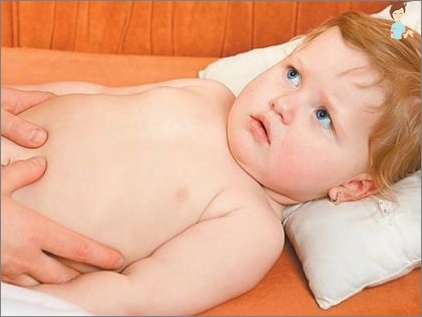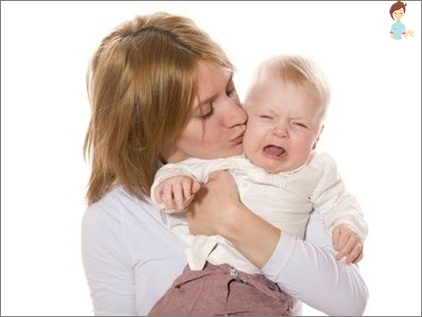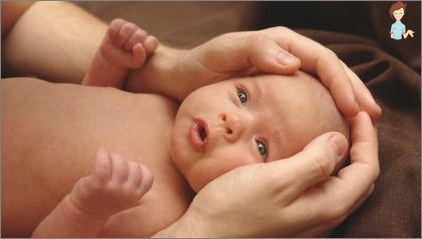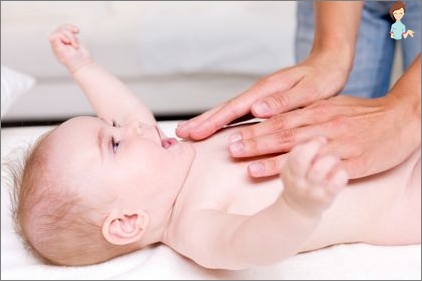Why arise and when colic passes in the infants – the mother’s diet and the child with colic in the stomach in newborns
From what arise and how the colic is manifested in newborns – how to recognize? Reasons for colic in infants – how long colic for newborns continue? Mom’s diet and baby with colic in a newborn – on (site name)
Almost 70% of newborns face colic, t.E with intestinal spasms that arise due to increased gas formation. Another non-developed digestive system of the child (after all, all 9 months, the child eaten through the umbilical cord) and swallowing excess air during feeding lead to the blown of the tummy, and the joyful to this kid turns into a crying, screaming and knocking legs that seek about help.
See also: We study the diaper – what can tell the newborn poop?
The main causes of colic in infants – when begin and when colic in newborns pass?

Parents of newborn children need to be ready for the so-called «Rule three»: Colic starts from about the third week of the baby’s life, last three hours a day and usually end in three months.
Colics in newborns occur for reasons:
- Unhabled digestive system and the imperfection of food suction leads to the bloating of the abdomen (meteorism) in infants. Meteorism arises due to the large accumulation of gases in the thick intestine. As a result, the pressure on the intestinal wall increases and muscle spasms occurs.
- Functional immaturity of the departments of nervous muscular apparatus, which regulate the work of the gastrointestinal.
- Immature enzymatic intestinal system, When the lack of enzymes for the splitting of milk arises (it happens when the baby has crossed).
- Constipation.
- Violated diet nursing mom, When a nursing mother eats foods causing excess gas formation.
- Seawing air during feeding (Aerofagi). It occurs if the kid sucks too quickly, the nipple is incorrectly captured and if after feeding the baby does not allow the air, t.e immediately laid, without holding pre-it in a vertical position.
- Violated baby food cooking technology (too or weakly divorced mixture).
- Weak musical muscles
Symptoms of colic in newborns – how to recognize them, and when you need to urgently consult a doctor?
Intestinal colic in a newborn very similar to the symptoms of pyelonephritis, appendicitis and a number of other abdominal diseases. Therefore, quite often adults mistakenly diagnose your baby colic.
In order not to miss a more serious illness, a doctor consultation is important!

When Coliki begins in a newborn, then he:
- Knocks down with legs and pressing them to the chest;
- Begins to shout sharply;
- Refuses meals;
- It is too tightened, so the lyrco is blushing;
- Tensum strains.
Wherein stool changes are not observed, and the child does not lose its weight. Most often colic in newborns are observed in the evening, after feeding.
With colic There is no vomiting, cough, rash, high temperature. If such signs are present, then you need to contact the doctor to find out their appearance.
Products causing colic in infants – Corrective diet nursing mom
To reduce the suffering of a baby from colic, a nursing mother should monitor its diet: cut to a minimum, or Exclude general products causing colic in infants. So that in breast milk is enough vitamins, a woman should not eat monotonous.
See also: Nutrition nursing mom immediately after childbirth – what can eat breastfeeding woman?

For nursing mothers, products are very useful:
- meat (lean);
- Fish (boiled or baked);
- Vegetables (boiled, baked, stew, but not fresh);
- Fruits (baked apples, bananas).
It should be temporarily not to use those products that increase gas formation:
- cabbage;
- beans;
- beans;
- grape.
In the first month of feeding it is forbidden to use as well:
- whole cow’s milk;
- coffee, black tea;
- sour cream;
- raisin.
With colic in infants, mom should Fully eliminate dairy products, T.To. Alien proteins that are in milk can cause colic in newborns.
See also: Proper feeding of a newborn – baby feeding rules for breasts.
From the second month to food mom Enchanted raw vegetables, nuts, sour cream, sour milk products (cottage cheese, kefir, rippy)
From the third to the sixth month Honey, fresh juices are added to the diet.
Nursing mother should exclude from their power:
- Sweet carbonated drinks;
- smoked and too salted products;
- margarine;
- mayonnaise;
- canned;
- Products containing taste additives (chocolate, chips, crackers)
Many specialists argue that the mother eaten does not affect milk, t.To. Breast milk – product of complex chemical composition, and synthesized from lymph and blood, and not from the stomach.
But every para «Mother and child» Individual. Therefore, if the kid often suffers from the bloating, then Adjust your diet and look at the kid reaction. Most likely, colic will not pass completely, but, thanks to the mother’s diet, their number will be significantly reduced.
Diet with colic in a newborn, which is on artificial feeding
With a baby that feeds on the mixtures, everything is much more difficult. If a child who eats breast milk, you need to feed on demand, then the child – the artificial is fed strictly by regime, and it is necessary to correctly calculate the dose of the mixture. Pubsove is one of the causes of colic.

Another difficulty is that the mixture you bought may not like the child. You will have from the mass of the products offered for artificial feeding Select the appropriate mixture it is for your baby. Then for 1.5 months, watch the child’s reaction to the new product.
Within 5 days after power, the mixture may be observed Allergic reactions, constipation or diarrhea, vomiting, But if after a week these symptoms did not disappear, then you need to change the mixture.
Best to picked up an adequate mixture specialist.
- To reduce the manifestations of colic in kids – artificials, you need, except for milk mixtures, give them Equal milk mixtures, which should occupy 1/3 of the total food of the child.
- Well remove attacks of colic teas: With Fennel Chamomile, as well as dill water, which can be prepared independently, or buy finished in a pharmacy.
On all the baby suffering from colic, the warmth and massage of the tummy, as well as the mummage of care, love and calm.
Lady-Magazine site.COM warns: self-medication can harm your baby’s health! Diagnosis should only put a doctor. And therefore – when anxious symptoms appear in an infant child, consult a specialist!


